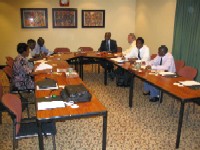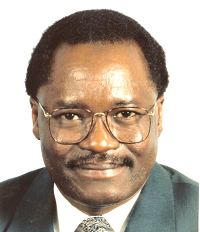| 2004 |
Research in Tanzania, Kenya, and Malawi leads to an ambitious array of planned enterprises:
| Subsidiary/Venture | | Location | | Managing Partner |
| |
| |
|
| RSDS Languages and Orientation Center | | Dar es Salaam, Tanzania | | RSDS |
| Dar CDA Mushroom | | Dar es Salaam, Tanzania | | RSDS |
| Great Lakes Mushroom, Tanzania | | Kagera, Tanzania | | RSDS |
| Ahakishaka Bean and Corn (ABC Co.) | | Karagwe, Tanzania | | RSDS |
| Ahakishaka Water Bottling | | Karagwe, Tanzania | | RSDS |
| Bukoba CDA Nutrition Services | | Karagwe, Tanzania | | RSDS |
| Kagera Widows Computer Centers | | Kagera, Tanzania | | RSDS |
| Makueni All-Season Fruits & Vegetables | | Makueni, Kenya | | WCEC |
| Nya Nya Dam and Water Company | | Makueni, Kenya | | WCEC |
| Taita Hills Dairy | | Taita/Taveta, Kenya | | WCEC |
| Rukanga CDA Mining | | Taita/Taveta, Kenya | | WCEC |
| Voi CDA Sunflower | | Taita/Taveta, Kenya | | WCEC |
| Wumingu Foods Cooperative | | Taita/Taveta, Kenya | | WCEC |
| Kighombo Reservoir and Water Co. | | Taita/Taveta, Kenya | | WCEC |
| Chiradzulu CDA Fish | | Chiradzulu, Malawi | | BMI |
| Chiradzulu Model Farm and Solar Station | | Chiradzulu, Malawi | | BMI |
| One Village One Product (ONOP) Pilot | | Lilongwe, Malawi | | BMI |
| Jali Epicenter Pork and Rice | | Jali, Malawi | | BMI |
| Jali Epicenter Dairy | | Jali, Malawi | | BMI |
|
| At the beginning of 2004 most of the businesses above are in the planning stages. Many are using local volunteers and some seed money to build organizational capacity and undertake research, advocacy, licensing, and other steps toward a quantified business plan. A few ventures on the list are already up and running and using significant capital. The RSDS Languages and Orientation Centre has two locations (Dar es Salaam and Mwanza) and is running language classes. Dar CDA Mushroom, which started construction in 2002 and began selling fresh mushrooms locally in the spring of 2003, is expanding its production and marketing capacities and hoping to export. Great Lakes Mushroom, the subject of a major organizing conference in October 2002, is expecting to begin construction in the second half of 2004. Ahakishaka Water Bottling is completing construction of its springwater capture, pumping, and tank facilities, and is expecting to start bottling water for export in 2004. All of these concerns need capital in 2004 to realize the hopes of their planners and volunteers. |
| In February WILMA and WilmaFund Five-Year Plans develop a detailed budgeting and financing model and begin preparing full business plans for the proposed enterprises. |
| WILMA documents and circulates The WilmaFund Pipeline: A Reference Manual for Investors in WilmaFund, presenting plans and projections for ventures in several countries. |
| WILMA signs Management Agreement with World Light Caring Mission (WOLICAMI), in Kampala, Uganda, to set up a Community Enterprise Services Program within WOLICAM. WILMA finances the start-up of this Program. |
| WILMA signs Management Agreement with WILMALAWI (to be registered as an NGO) to serve as WILMA's National Managing Partner in Malawi (to operate independently of BMI, which is becoming ensnared in political controversy). | | 
A WILMALAWI planning meeting in Lilongwe |
|
| WILMA creates a PowerPoint show, WilmaFund: WILMA's Holding Company in Africa for Community Development Venturing, and circulates it via the internet to potential investors in ventures and donors to WILMA and WilmaFund. |
| WILMA staff continue to work in Africa, helping its partners in Kenya, Malawi, Tanzania, and Uganda solicit aid from major international institutions such as the World Bank, USAID, DFID, and other bilateral aid agencies. |
| In December the contract with a Washington, DC, fundraising consultancy ends with not a single dollar raised. Some potential donors praise our program but advise us that their internal funding regulations, based on strictly-defined categories of eligible institutions, do not allow them to support such innovative efforts. |


